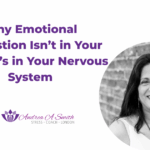Being emotionally resilient is your ability to bounce back after dealing with trying situations or events depending on your emotional fortitude. Also, navigating some erratic emotions while adhering to your fundamental beliefs.
For instance:
- Remaining focused and paying close attention to criticisms or disapproval, despite feeling upset and tempted to criticise others.
- Upholding your commitment to stick to your goals despite feeling overly stressed out and being mindful that indulging in unhealthy foods may temporarily ease your symptoms.
As opposed to emotional brittleness, which makes us subject to unpleasant feelings and results in self-defeating actions:
- Not acknowledging and processing your irritation in favour of responding with subtly hostile words.
- When hearing unpleasant news, giving in to worry and imagining catastrophes.
Avoid these three destructive practices that increase emotional vulnerability to strengthen the emotionally resilient person you want to be:
1. Getting Rid of Painful Emotions Naturally: we avoid discomfort-causing situations. For example: To avoid serious harm, one should immediately remove their hand from a burning skillet. However, the goal of retracting your hand isn’t to avoid discomfort but to prevent hazards like tissue damage.
Pain serves as a forerunner of dangers to come. So, trying to escape discomfort is not a good idea. Imagine how many severe burns you’d sustain if your hands couldn’t send pain signals to your brain.
This idea also applies to emotional suffering. Though painful, emotions like fear, guilt, or grief don’t necessarily carry a risk.
A straightforward example: When a bear is after you, fear develops. Your brain uses fear to help you survive by preventing a vicious bear assault. The bear itself is the real danger!
Unfortunately, it is easy to see emotional anguish as a threat and run away in response.
- You start to feel anxious about a crucial project and focus on unimportant activities.
- You become depressed and lose yourself in humorous TikTok videos.
- Your lover asks how you’re doing after a demanding day. You avoid discussing your worries about losing your job by saying you’re “slightly stressed.”
The situation: Although it could provide short-term comfort, avoiding emotional anguish only worsens long-term suffering. Avoiding a particular experience repeatedly causes your brain to interpret it as dangerous, heightening your terror when it does.
This reaction is beneficial when facing real risks, but it is harmful when the pain is caused by something that isn’t fundamentally dangerous. Your brain becomes convinced that unpleasant feelings are dangerous if you avoid them often.
But emotional pain is a part of being human that cannot be avoided. Trying to avoid it simply makes your misery worse.
Remember: Adversity is not always accompanied by unpleasant sentiments. Stop running from your emotions and start practising emotional validation. learn and practice to be emotionally resilient.
- Believing Your Thoughts: The power of the mind is immense. Your emotions and actions are largely influenced by your mind’s ability to build stories and form convictions.
- A client had sought my help because he was at risk of being fired if he didn’t control his anger at work and work with his co-workers.
- When co-workers didn’t finish duties on time and to his rigorous standards, he became enraged.
- Finally, he realised that his aspirations were unreal. However, he believed being late was bad in and of itself, which fuelled his anger & irritability.
- Further investigation revealed that this conviction was based on a statement made by his father to him as a child: “Tardiness is a form of disrespect to those around you.”
- For more than 40 years, the client’s instant response to being late was to sense contempt, which in turn sparked wrath.
- It’s interesting to note that he never challenged or investigated this story over those years.
- His wrath and aggravation quickly subsided after reassessing the situation and looking for other justifications for being late.
Our emotions and behaviours are significantly influenced by the narratives we create. This client became overly irritated and furious due to a single, uncontested story that his mind kept repeating.
He was emotionally vulnerable when he was angry because he had blindly believed this one story. On the other hand, after becoming aware of and examining his thoughts, beliefs, and tales, his level of rage and irritation dramatically decreased, and his behaviour and performance significantly improved.
Remember: Thoughts are not synonymous with truth. Cultivate the habit of questioning your thoughts and narratives, and you’ll uncover your emotionally resilient self you never deemed attainable.
4. Surrendering to Emotional Whims: As was already established, feelings, no matter how strong they are, help us. Therefore, we should avoid labelling emotions as dangerous or treacherous and attempting to avoid them immediately.
However, it is as dangerous to believe that our emotions always lead us on the right course.
For instance: You’ve always wanted to go on an African safari, but the prospect of accepting a friend’s offer makes you nervous because flying is something you detest. The reason you ultimately turn down the offer is complicated, but ultimately it comes down to your fear of fear.
Here’s another typical example:
- The barista serves you the wrong drink—a chai rather than a vanilla latte. You imagine the difficulty and the barista’s embarrassment if you ask for a replacement. As a result, you decline your planned vanilla latte in favour of the chai.
Emotions control your decisions in both situations. The problem comes if emotions influence your decisions and cause you to act in a way inconsistent with your convictions.
Certainly, there is no downside to paying attention to and considering your feelings. Sometimes your emotions and your values are perfectly in line. However, giving in to emotional whims regularly, especially when making important life decisions, puts you at risk for regret, lowered self-worth, and emotional brittleness since you compromised your values to placate your emotions.
Remember: Recognise your feelings, but avoid blind faith. Emotions have the same capacity for deceiving you as they bring you to fulfilment. Use your values as a guide while making decisions.
To sum up: Avoid these three destructive practices to improve and be emotionally resilient:
- Running from painful feelings;
- Believing unjustified notions;
- Allowing feelings to influence decisions
Have a look at this blog and let me know if you have anything to add. Read what my clients say about me. Get in touch if you want to book a call with me and learn how to be emotionally resilient: hello@andreaasmith.com










